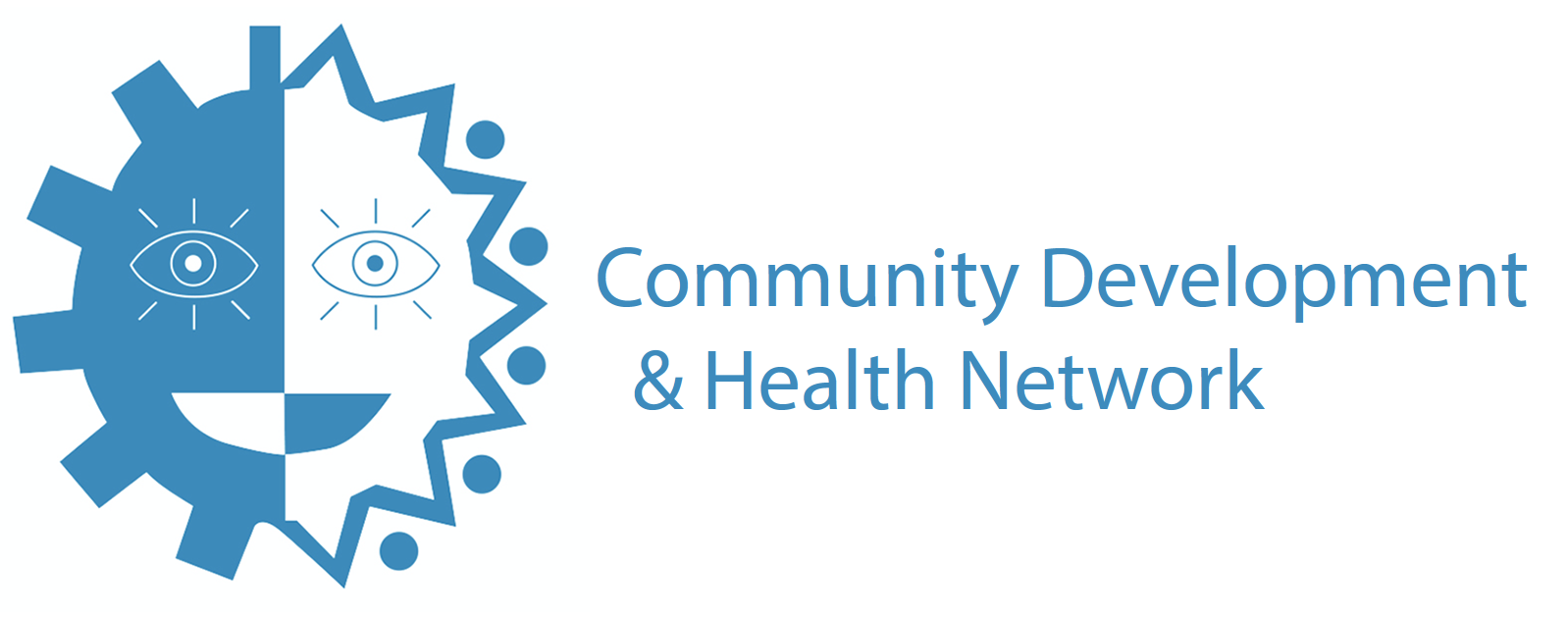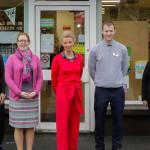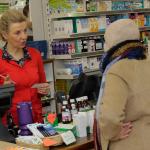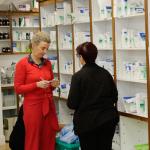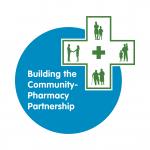Ensuring health information and knowledge reaches every person in the community
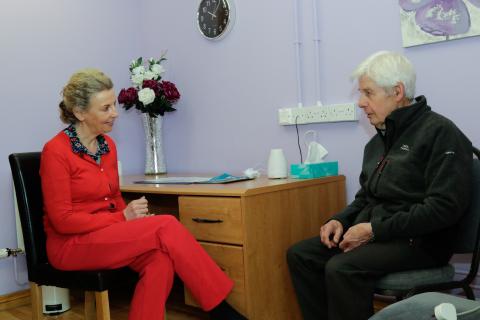
At the heart of Toome village, a small rural village in the north-west corner of Lough Neagh, lies Gribbin’s Pharmacy. This independent pharmacy has a special interest in health promotion and has engaged with Community Development & Health Network (CDHN) through its Building Community-Pharmacy Partnership (BCPP) Programme for many, many years. As part of 'Ask Your Pharmacist' week, we spoke to Anita Gribbin of Gribbin Pharmacy about her involvement in BCPP, changes in community pharmacy environment in Toome and much more.
Q: You first became involved in BCPP over 16 years ago – what was it that first sparked your interest?
Anita: I have worked as a Community Pharmacist in the Toome area for over 25 years. This area is disadvantaged with many single parent families - loneliness and mental health issues are commonplace. Many people in the community don’t have access to a car so the pharmacy is the hub of the community for health provision. It was apparent that there was a need for additional help and support for patients, beyond the usual remit of a Community Pharmacy.
I didn’t have time in the Pharmacy environment to give the adequate one-to-one support necessary to address more complex health needs and I realised that the BCPP programme could provide a medium for more individualised support. Since then, the Pharmacy has been involved in a range of BCPP programmes such as the establishment of a ‘Time for Me’ Group for women in the area which is still running after five years; the Carers’ Group; the Mother and Toddler group; and, most recently, the Men’s Shed. As a direct result of an initial BCPP programme on mental health and awareness in the community, SOLAS Community Counselling services was established with pharmacy support and input.
Q: The Community Pharmacy environment has changed so much over the years with increased emphasis on public health. Do you think involvement in the programme has changed the way that you engage with people on these issues?
Anita: Yes, my involvement with BCPP over the years has most certainly changed the way in which I interact and engage with patients. Increasingly patients are experiencing mental health problems, loneliness, addiction issues, money worries, stress, fertility issues and other health concerns. We constantly signpost patients to other professionals and services in the area such as SOLAS (Community Counselling services), Mid Ulster Women’s Health Clinic (run by two gynaecologists), Mid Ulster Pilates and Physiotherapy, our Wellness Clinic and the local Men’s Shed.
We try to encourage relationship building where possible and involvement in local groups, which has improved participants’ sense of belonging. The Wellness Clinic is multi-disciplinary and offers therapeutic treatments (such as craniosacral therapy, podiatry, homeopathy, food sensitivity testing etc) delivered by a range of professionals. My engagement with BCPP has also encouraged promotion of health awareness and self-care via our social media platforms and the Pharmacy aligns with the NHS calendar of health promotion campaigns. Involvement in these programmes has deepened my understanding of the individual obstacles that prevent people implementing positive health changes.
Q: Building social capital is an important outcome of the BCPP programme – how has community activity and development changed in Toome over the years? Do you feel people are more connected?
Anita: There has been a marked change in community activity over the years and I feel the people of Toome are considerably more connected. We work closely with TIDAL cross community group, local schools, women’s groups, senior citizens and sports clubs in the area. The Pharmacy has been instrumental in organising fundraising activities in the community to sustain the services of SOLAS. The most recent ‘Darkness into Light’ walk in Toome came about following a two-day training course on suicide awareness in the area. This is now a very well supported and established community event and has helped connect the people of Toome.
We work closely with local sports clubs and schools in the community which play a vital role in preventing childhood obesity, increasing social inclusion and improving the overall health (both physical and mental) of children, young people and adults in the area and beyond. The role of the Pharmacy in building rapport and partnerships with businesses and support organisations has enabled networks to be formed which are helping people to feel more connected and increases their community activity. For example, TIDAL has asked the Men’s Shed to supply flower baskets and displays (all made by the men) around the village.
Q: You have worked with lots of different types of groups over the years – how did you make those connections?
Anita: I have a long-standing history of working with Community Development and Health Network (CDHN) through its BCPP programme and it was this initial relationship that helped me to make connections with people in the local community. The first BCPP project was establishing the ‘Time for Me’ group which provided single mothers with an opportunity to meet people and reduce issues associated with loneliness and social exclusion. News spread of our successful collaborations and other groups then approached me to work with them on a BCPP project.
Q: Improving Health Literacy is an important aspect of the BCPP programme. What improvements have you seen in participants’ understanding of health and their ability to use health information and/or navigate health structures?
Anita: The reason I became involved in the BCPP programme in the first place was to equip my patients with the tools and knowledge to improve their own health, something that couldn’t be achieved in the daily running of a busy Community Pharmacy. It was evident that it could be successful in group settings where patients were comfortable in their own environment and accompanied by like-minded people. I did some work with a local men’s group about ten years ago and the Men’s Shed was established in the last two years. This group of men are mostly unemployed and some struggle with health issues. Topics of talks included stress management, addiction issues, cycle of change, nutrition, prescription medicine queries and the use of supplements.
The interaction and participation by the 12 men was so positive that the participants themselves requested assistance in applying for the Level 2 BCPP funding which resulted in twice the number of sessions and the involvement of a wider range of healthcare professionals. These men now approach the Pharmacists with their health queries and as a direct result are empowered to take responsibility for their own health. I noticed the same improvement with every BCPP funded project and it was this that kept me motivated to continue working with local groups. This ability to improve your health comes not just from the local pharmacy but from the sustained relationships formed between participants in the individual programmes.
Q: Over the years, BCPP has moved toward working with a smaller group of people recognising that the intimacy and trust built within smaller groups can have powerful and lasting effects on outcomes. Tell us a little about your experience of group work.
Anita: Group work has been an integral part of all our BCPP projects and my experience has been hugely positive. Participants have built strong, lasting relationships with their peers and all of the Pharmacists in Toome Pharmacy. I have found that participants are more comfortable and confident to talk and share their experiences in a smaller group setting. The intimacy and trust built within these groups has dissolved barriers and improved access to healthcare information. As a result, we are being approached daily for support on medical, social and family issues and are learning all the time from our interactions with our patients.
Q: Have you seen health improvement as a result of your very successful BCPP projects?
Anita: There has been a massive improvement in the overall health and wellbeing and an increased sense of belonging in all participants of our BCPP projects. A big learning for the participants is that they are empowered to take responsibility for their own health. A recent success story was just last week when a participant of the Men’s Shed BCPP programme came in to express his appreciation for our help. On retirement he felt he had lost his way and had nothing practical to offer anyone. The BCPP programme appealed to him He found it informative, a great way to meet other people and looks forward to attending each week. Our pharmacy services are much better utilised, and I feel the lives, health and wellbeing of the local community have all improved.
Q: What would you like to see happen in Pharmacy to further support communities?
Anita: Pharmacy needs adequate resources to be able to employ professional and counter staff to run group work sessions with vulnerable, isolated patients in their community.
Q: Have you undertaken training or explored community development as a topic more since being involved with BCPP?
Anita: I have undertaken Health Literacy Training through Northern Ireland Centre for Pharmacy Learning and Development and attended many CDHN training and development workshops. I have undertaken communication courses as well as a two-year counselling course this is an area that I am passionate about!
Q: How has your knowledge and understanding of community development changed over the years?
Anita: I realise I was very naive 25 years ago in my ability to impart health knowledge and information and I was also naïve in my understanding of community development. Working with CDHN and local community groups such as TIDAL, SOLAS, Men’s Shed and the Carers’ Group has humbled me and raised my awareness on the ever-increasing needs in my community. This has motivated me to continue to grow and learn from the local people and organisations such as CDHN to ensure that health information and knowledge reaches every person regardless of their social, educational or family background!
